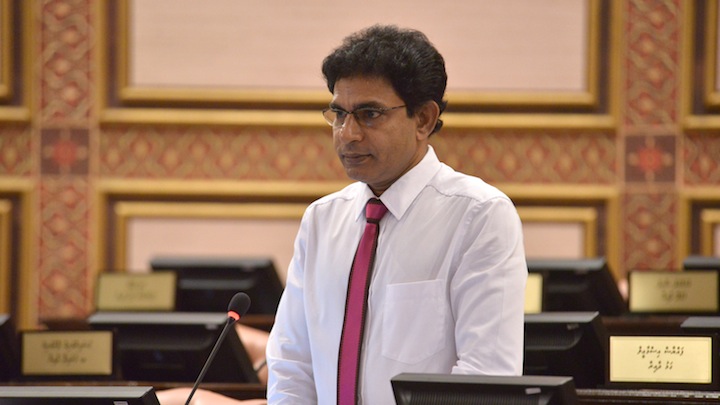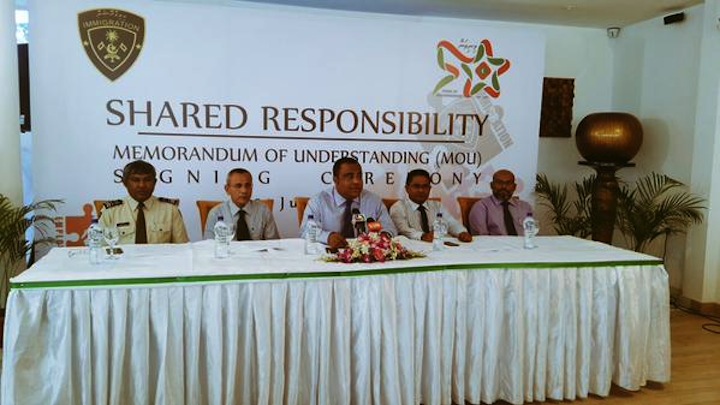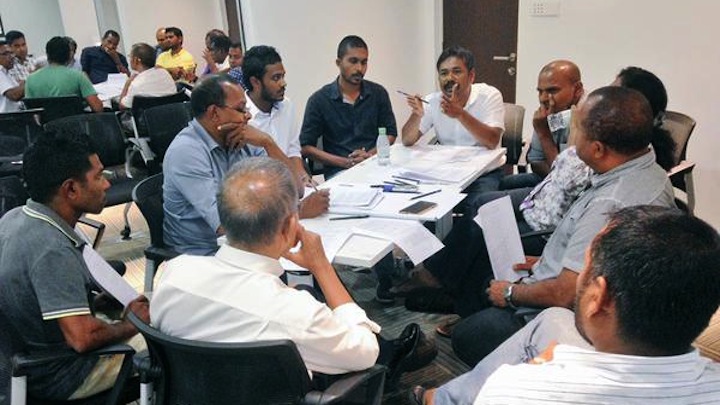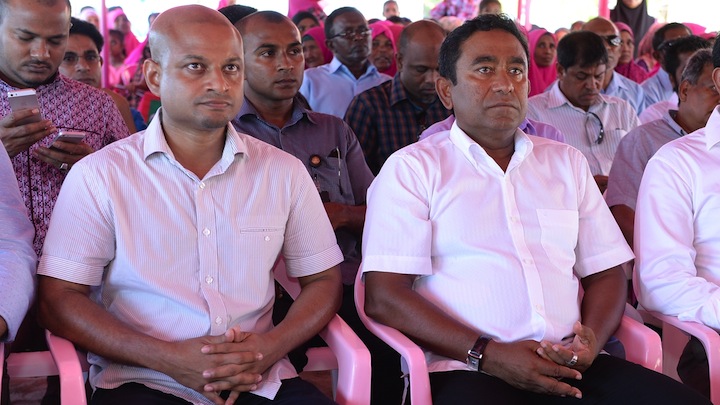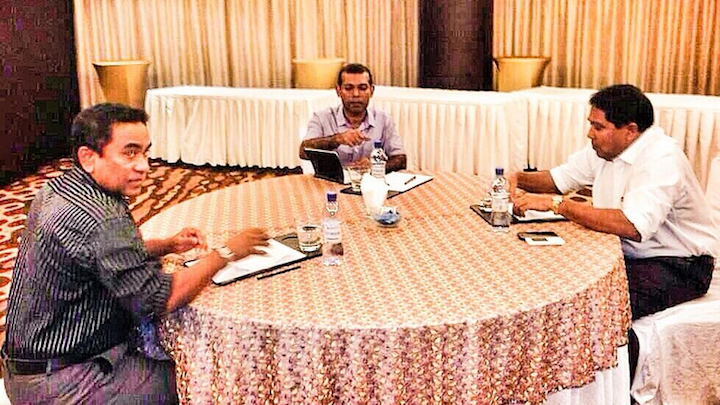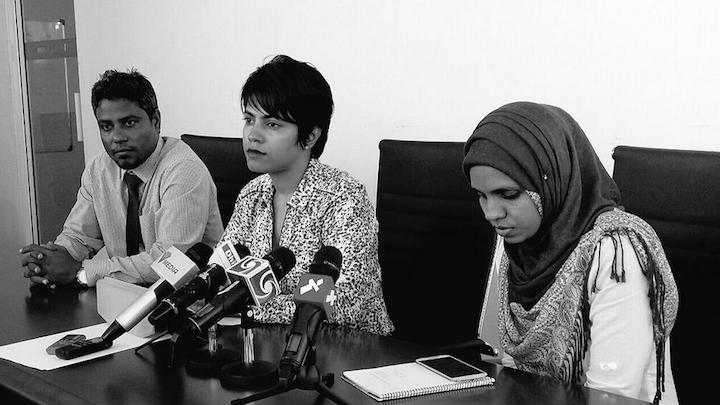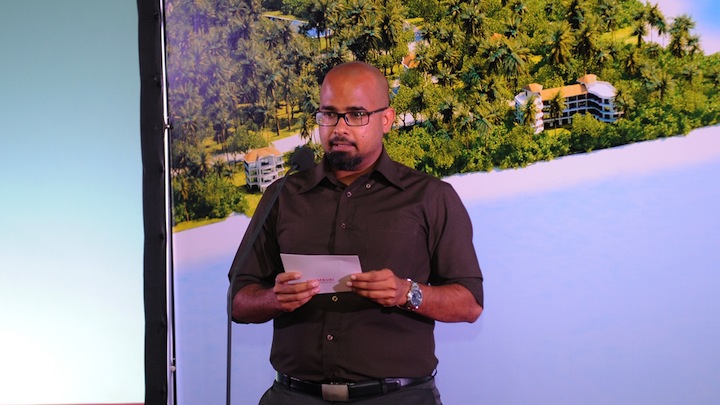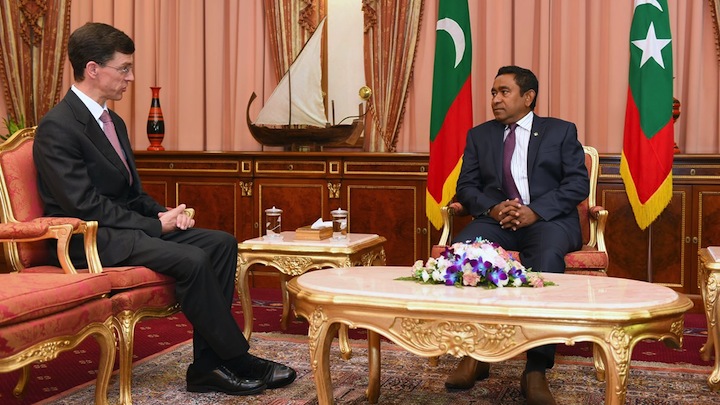The main opposition Maldivian Democratic Party (MDP) has proposed transferring imprisoned ex-President Mohamed Nasheed and other political leaders to house arrest as “immediate steps to build trust” in a draft roadmap for political reconciliation.
The roadmap was laid out in a preliminary paper compiled at a workshop held by the MDP national council last night, and is to be shared with Adhaalath Party and the Jumhooree Party (JP) for the three allied parties to arrive at a “consensus from which to begin negotiations with the government.”
The paper also proposes negotiations on changing to a parliamentary system of governance and reforming the police and the judiciary.
President Abdulla Yameen had called for separate talks with the three allied opposition parties, two weeks after a historic anti-government protest on May 1.
He has, however, ruled out negotiations for the release of Nasheed and ex-defence minister Mohamed Nazim, whose arrests in February triggered the ongoing political crisis.
Hundreds were arrested and injured in clashes on May Day.
Although the government has proposed separate talks, the MDP says it “would be of more benefit for the Maldivian people, if the MDP, Adhaalath and Jumhooree Party were to find common ground and present a united stance for negotiations.”
The national council is due to hold a second workshop tonight to discuss the paper, but Minivan News understand it will not undergo substantial changes.
Adhaalath Party president Sheikh Imran Abdulla was meanwhile arrested last night ahead of the first hearing of his terrorism trial tonight, throwing the possibility of the talks going forward into doubt.
JP deputy leader Ameen Ibrahim and council member Sobah Rasheed are also facing terrorism charges. Imran and Ameen were among the representatives of their respective parties for the talks.
Building trust
Stressing the importance of building and maintaining trust among all political actors, the MDP said imprisoned politicians must be transferred to house arrest, until the truth of the accusations against them can be verified.
Along with Nasheed and Nazim, the MDP says former defence minister Tholhath Ibrahim and former ruling party MP Ahmed Nazim should also be transferred to house arrest.
The latter pair were convicted of terrorism and corruption, respectively.
The government must also withdraw charges against the opposition leaders and supporters arrested from protests, the paper said.
The MDP also called for an end to “politically motivated” targeting of opposition-aligned businesses, including JP leader Gasim Ibrahim’s Villa Group, former MP Abdulla Jabir’s Yacht Tours, and the VA Company.
The tax authority froze Villa’s bank accounts last month. Local media has said the criminal court has issued a warrant for Gasim’s arrest. The JP leader is in Bangkok at present.
Other immediate steps include ensuring job security of government employees facing dismissal for attending opposition protests, ceasing disciplinary action against councillors for participating in political activities, and stopping “government actions that disrupts the peacefulness of protests calling for the release of President Nasheed and other political prisoners.”
The government must also publicly disclose information gathered by Maldivian and foreign intelligence agencies regarding the murder of MP Afrasheem Ali and the disappearance of Minivan News journalist Ahmed Rilwan and launch independent investigations involving civil society organisations, the MDP said.
Parliamentary system
Once the immediate steps have been taken, the MDP proposed negotiations for “a smooth and peaceful” change from a presidential to a parliamentary system of government.
The paper noted that coalitions led by the MDP and the Progressive Party of the Maldives (PPM) won the 2008 and 2013 presidential elections, respectively. But both coalitions disintegrated soon after the polls.
Coalitions between political parties are incompatible with the presidential system and the Maldivian constitution, the MDP contended, and would not lead to stability as the electorate is unwilling to grant a popular mandate to a single candidate or party.
The party that holds a majority in the current parliament should form a government under the new system, the paper suggested.
The ruling PPM and coalition partner Maldives Development Alliance controls a comfortable majority of the 85-member house. If the MDP’s proposal is accepted, the PPM will continue to lead the government.
However, public referendums should take place to legitimise the decisions of several MPs who have switched parties since the May 2014 parliamentary polls.
Judicial reform
The MDP said the party believes that it remains “an easy task to change the government using the security forces” as a police and army mutiny had forced former President Nasheed to resign on February 7, 2012.
In order to prevent a similar situation, the party recommended identifying the mutinous elements and soldiers, seeking reconciliation, and establishing trust and good will between the officers and the MDP.
Among the steps for judicial reform, the party recommended changing the composition of the Judicial Service Commission, completing investigations into allegations of judge’s misconduct, and setting a university degree as the minimum qualification to become a judge.
Other proposed measures included immediately enforcing the new penal code, passing an evidence law and criminal procedures code, and repealing amendments brought to the Judicature Act that saw the removal of former Chief Justice Ahmed Faiz Hussain and Justice Muthasim Adnan.
The party also proposed amending the constitution to state that the Supreme Court would not have the authority to make laws and to allow an equal say for ruling and opposition parties in appointing members to independent institutions.
Likes (1)Dislikes
(1)Dislikes (0)
(0) 